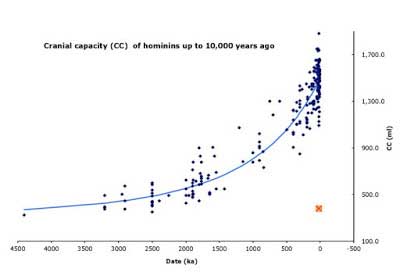
Also see:
Prominent Hominid Fossils
Creationist Arguments: Brain Sizes
According to The Big History Project concerning the history of the cosmos, life and humans, our distant ancestors in Africa began to move about more as the trees there were replaced by ever widening grasslands. Due to trees growing scarcer and grasslands widening between groups of trees our ancestors were forced to walk longer to get to the next group of trees and were forced to seek food of more diverse kinds. And in grasslands being able to see further via standing to see above the grass is also imperative for protection and to keep together with others. Also, apes are not armed with sharp-cutting claws, lengthy fangs, and they lack the ability to run as swiftly as four legged predators. So our ancestors had to learn to cooperate to stay alive, seek food, and flourish. And the larger the brain the more discriminating and more cunning, thus adding additional hurdles (i.e., natural selection) that each generation had to leap over before being able to pass along those cunning genes to the next generation, so we grew more cunning each generation as a result. There are other hypotheses one could add to those that donʼt detract from what was mentioned.
There were other mammals on the planet that developed larger brains than the rest but they didnʼt have free hands to manipulate things, and rarely had brains as large as ours compared with our body mass. Other large brained mammals like elephants and cetacea (dolphins, whales) didnʼt develop languages, and perhaps not so large a vocabulary as our ancestors did, and they certainly did not develop the written word which enabled our ancestors to continue to build on what earlier generations had learned. And of course even though some apes in the African Savannah became bipedal, not all species of apes did elsewhere on the planet. So not every ape species evolved into upright hominids. And the fossil record is littered with extinct species of upright hominids that didnʼt make it, other ancient species of human also went extinct in the process. And some humans in the past had brains larger than ours at present like Boskop Man “Back there in the past, ten thousand years ago… His brain was bigger than your brain.”
Google “Boskop Man,” though note that the Google images of Boskop Man include some weird hoaxes.
- And interestingly, some nonhuman species are better endowed in certain key cognitive regions than humans are.
- The Mindʼs Big Bang—Fifty thousand years ago, something happened — the modern human mind emerged, triggering a creative, technological, and social explosion. What forces contributed to that breakthrough?
- Are We Evolving Into A Different Species?
- Is The Human Brain Still Evolving?
- Even within the last 100,000 years, the long-term trends towards smaller molars and decreased robustness can be discerned. The face, jaw and teeth of Mesolithic humans (about 10,000 years ago) are about 10% more robust than ours. Upper Paleolithic humans (about 30,000 years ago) are about 20 to 30% more robust than the modern condition in Europe and Asia. These are considered modern humans, although they are sometimes termed ‘primitive’. Interestingly, some modern humans (aboriginal Australians) have tooth sizes more typical of archaic sapiens. The smallest tooth sizes are found in those areas where food-processing techniques have been used for the longest time. This is a probable example of natural selection which has occurred within the last 10,000 years (Brace 1983).
- Physical activity helped make our ancestors smarter
- Carbohydrates helped make humans smarter
- Eating insects helped make humans smarter
- Climate change helped make humans smarter
- Paleoanthropology Links
- Eleven year old girl headed to Harvard, “Riaʼs first courses in her neural cryptography major are neurobiology and the study of artificial intelligence. ‘I want to study the human brain and how evolution of the brain occurred and just understand how thoughts are formed,’ she said. After she finishes her undergraduate degree, she plans to have her masterʼs by the age of 15.”
You also might want to check the Google NEWS search engine using “evolution of the brain” or other search terms, and add some Google ALERTS on the topic to keep up to date.


No comments:
Post a Comment